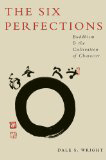 In “Buddhists at war,” a recent piece for the Times Literary Supplement, Katherine Wharton reviews two books: Buddhist Warfare, a collection of essays on Buddhist violence edited by Michael K. Jerryson and Mark Juergensmeyer, and The Six Perfections, a treatise on Buddhist ethics by Dale S. Wright. In her review, Wharton reminds us that Buddhism, as much as any living expression of a world religion, can fall prey to human imperfections. Wharton highlights essays in Buddhist Warfare that examine topics like how the Buddhist teaching of no-self informed Japanese military training during the Asia-Pacific War and how a certain Mahayana text has been used to justify “compassionate torture.” While it is useful to study and remember these misunderstandings and misuses of Buddhist ideas, I hope that it’s not breaking news to anybody that religion is a human pursuit and therefore prone to human tendencies, such as violence.
In “Buddhists at war,” a recent piece for the Times Literary Supplement, Katherine Wharton reviews two books: Buddhist Warfare, a collection of essays on Buddhist violence edited by Michael K. Jerryson and Mark Juergensmeyer, and The Six Perfections, a treatise on Buddhist ethics by Dale S. Wright. In her review, Wharton reminds us that Buddhism, as much as any living expression of a world religion, can fall prey to human imperfections. Wharton highlights essays in Buddhist Warfare that examine topics like how the Buddhist teaching of no-self informed Japanese military training during the Asia-Pacific War and how a certain Mahayana text has been used to justify “compassionate torture.” While it is useful to study and remember these misunderstandings and misuses of Buddhist ideas, I hope that it’s not breaking news to anybody that religion is a human pursuit and therefore prone to human tendencies, such as violence.

What’s discouraging in “Buddhists at war” is that Wharton uses the violent expressions of Buddhist ideas in Buddhist Warfare to chide Wright’s The Six Perfections, which contains useful methods for cultivating positive Buddhist virtues. [Full disclosure: Wright was a professor of mine at Occidental College.] Wharton argues that Wright’s exploration of “emptiness” is naïve in that it doesn’t see the potential for “emptiness” to be misappropriated. She writes:
Wright also chronically overestimates the curative value of identifying with “interdependency”. This overestimation is so stubborn that it leads him to cut himself away from the greatest resource he has: traditional Mahayana. In traditional Mahayana, the idea of “interdependency”, or emptiness, is always moderated by that of karma, the principle that good always leads to good and bad to bad. Wright argues that contemporary Buddhism has no need for such an antiquated principle of systematic cosmic justice. He argues that the world view of modern physics excludes the possibility of karma. Wright’s essential ethical teaching, then, his cure of all evil, is that we must all identify with a concept of “interdependency” without justice.
What Wharton fails to understand here is that even though “interdependency,” as Wright understands it, is without a conceptual justice of right and wrong/good and bad, there is a non-conceptual compassion built-in to “interdependency.” You aren’t nonviolent because it’s right thing to do per se, but rather because it’s the natural thing to do when you realize that we’re fundamentally co-dependent. When we understand this it makes no more sense to care for oneself than it does to care for everybody else. Understanding emptiness in a way that leads to violence, as those do in Buddhist Warfare, is a misunderstanding of the term. So, sure, many people have historically misunderstood and misused the concept of “emptiness.” That’s to be expected. And we have to do our best to make sure that people don’t use religious ideas to legitimize violence. Wharton would agree with this, I think, which is why I can’t figure out why she comes down hard on Wright’s The Six Perfections, a book that earnestly encourages people to cultivate the virtues of generosity, tolerance, morality, energy, meditation, and wisdom. UPDATE: Buddhist blogger Barbara O’Brien tackles Wharton’s review. Also, a comment from Michael Jerryson, co-editor of Buddhist Warfare, on The Reformed Buddhist Blog.
Thank you for subscribing to Tricycle! As a nonprofit, we depend on readers like you to keep Buddhist teachings and practices widely available.